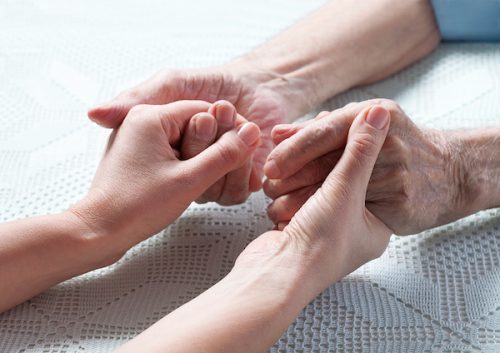When you think of “the sick,” who comes to mind? Those in hospital beds or clinic hallways? Those with infections — COVID19, perhaps, or some other illness — vividly visible in flushed cheeks and runny nose?

What about someone who looks perfectly healthy but is struggling with depression? Or someone who manages life very well, but cannot move about in society as freely as others because of an immune system that makes even a common cold a potentially life-threatening occurrence? Or someone in excruciating, but unseen, pain?
On Feb. 11, 2022, World Day of the Sick will once again focus our prayer and attention on people who live with the reality and challenges of illness.
And this year, perhaps unlike any other, might be a good time to look beyond the obvious and understand those we might not be so aware of — the people in our midst who have chronic, invisible illnesses.
The U.S. Centers for Disease Control estimates that 6 in 10 adults in the U.S. have one chronic illness and 4 in 10 have more than one. Perhaps 96% of these illnesses are “invisible,” meaning the people who live with them do not appear to be ill.
Yet, “long-COVID,” diabetes, heart disease, fibromyalgia, dementia, arthritis, depression and related mental health challenges — these and other chronic illnesses are certainly bona fide medical conditions.
And each year, more diagnoses are made. This can be a blessing. Once identified, many chronic illnesses can be treated and/or managed effectively.
However, chronic illnesses often are not as easy to navigate as other temporary health challenges might be. They are ongoing and many times have no cure, as in the case of lupus, which I live with.
They can flare and subside in ways that make planning and goal-setting difficult. They can be costly; it is one thing to take a limited course of antibiotics for an infection and another thing entirely to have to budget for necessary, expensive medications on an annual basis.
And they can be met with skepticism, even denial, because they are so often felt, but not seen.
Chronic illnesses also affect others, especially family members. Parents with chronic illnesses might miss their children’s special events at school. Couples might struggle to stay together because of the added stresses of a spouse’s serious, ongoing health condition.
Life events that others sometimes enjoy freely often require special consideration. For example, retirement planning is more complex, and in earlier years, dating can be problematic because ongoing illness cannot be ignored, even if it is “love-at-first-sight.”
Despite the challenges, living with a chronic illness need not be a horrible experience, nor is it devoid of grace. With good medical management, understanding and creative planning, love can be nurtured, goals can be set and dreams achieved.
It does take patience to be a patient! However, faith, that marvelous gift that gives immeasurable strength, makes all the difference.
I know I’m not alone in witnessing to God’s wonderful blessings that, without chronic illness, I would never have enjoyed, and I know I’m not alone in expressing gratitude each day for the special people, even strangers, who walk with me as testament to Our Lord’s care and love.
World Day of the Sick gives us a wonderful opportunity to reflect on what it means to live with illness, either our own or others’, and to pray for ways to listen, learn and accompany one another throughout the rest of the year.
An awareness of those who live with invisible afflictions further helps us grow in understanding, compassion and love for faith that moves beyond the surface and embraces us all.
Maureen Pratt’s website is www.maureenpratt.com.
Top image: Bigstockphoto.com.






















